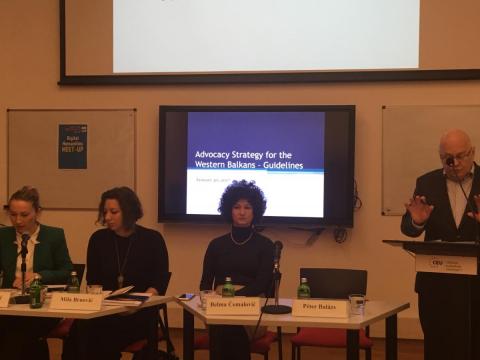Event report - "The Guidelines for Advocacy Strategy for the EU integration of the Western Balkans"

The Center for European Neighborhood Studies (CENS) held the presentation of Guidelines for Advocacy Strategy for the EU integration of the Western Balkans (ASWB) on 30 January 2017. The presentation was attended by a distinguished group of students, diplomats and academics.
The Strategy and the web portal (www.wb6.info) were presented by Hana Semanić, Research Fellow at the Centre for European Neighborhood Studies (CENS). She began by reminding how the idea of regional advocacy for EU integration of the Western Balkans (WB) came into being. The WB countries do not have an advocacy strategy and therefore the goal of Guidelines is to support and facilitate EU enlargement towards this region. The Guidelines argue that the key impediments can be confronted through joint advocacy endeavors which showed a one-year-long research. The idea of under-exploited power of advocacy brought together 10 think tanks (4 from V4 and 6 from WB) which are united in the idea to jointly advocate for regional cooperation and EU integration of the WB.
Belma Ćemalović, Project Officer at the Foreign Policy Initiative, spoke about the progress of Bosnia and Herzegovina (BiH) towards the EU, about the obstacles that stand on its way and potential approaches in order to overcome them. In 2003, the BiH Presidency has defined EU and NATO integration as the basic direction and goal of its foreign policy which has been reaffirmed on many occasions and followed by the recent application for EU membership in February 2016 and the Questionnaire that was receive in December 2016. The Directorate for EU integration is in charge of coordinating activities of the BiH authorities and supervising the implementation of decisions passed by the relevant institutions in BiH concerning the requirements related to the European integration. However, their approach is inward oriented - internal communication to the BiH public, but not to the EU. In the end she did the SWAT analysis of BiH and concluded by confirming that the country would greatly benefit from the common regional strategy that this project aims to develop.
Mila Brnović, Program Coordinator in the European Movement in Montenegro, outlined the case of Montenegro, pointing out how the Strategy will be a helpful tool for all the countries of the Western Balkans. Montenegro gaining the status of a candidate to the EU in December 2010 and opened accession negotiations in June 2012. Currently, it has 24 open chapters and 2 provisionally closed (Science and research and Education and culture). Montenegro’s foreign policy is strongly committed to European integration, which is additionally confirmed by opening separate ministries for the Foreign and European Affairs. When it comes to civil sector, the government of Montenegro decided to open working groups for negotiations for the representatives of civil sector which has been a success story, although transparency of their work could be improved. There are over 300 hundred representatives of civil sector in these working groups, but what remains closed for them and Montenegrin citizens are negotiating positions, which should be available at least on the level of working groups. Montenegrin national advocacy strategy is mostly based on the Communication Strategy, which has made improvements over the past years, but it is still focused inwards (towards its citizens). The citizens strongly support Montenegrin accession to the EU (over 70%), but they are rather poorly informed about the entire process. This is where the regional advocacy strategy can play a role – to focus on the EU and its member states as stakeholders and addressees of messages about the advantages of Montenegrin accession to the EU.
The discussion was moderated by Péter Balázs, Director of CENS and former Hungarian Minister of Foreign Affairs.
